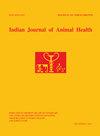维生素E对热应激肉鸡肠上皮细胞的影响
IF 0.5
4区 农林科学
Q4 AGRICULTURE, DAIRY & ANIMAL SCIENCE
引用次数: 0
摘要
背景:由于全球气候变化加剧,热应激给家禽业带来了巨大的经济损失。有几种营养素通常被用来对抗热应激。维生素E是一种用于防止因热应激而损失的饲料添加剂。本研究探讨了维生素E对热应激下肠上皮细胞损伤的保护作用。目前还没有关于维生素E对热应激下肉鸡肠上皮细胞损伤的反应的资料。方法:本研究试图结合凋亡因子、坏死和炎症标志物,揭示损伤及其对损伤的反应。试验选用30只肉仔鸡,随机分为3个重复进行试验分析。对照组保持在24℃,热应激组在35℃(5 h /d)进行热应激。热应激+维生素E组在35℃(5 h/d)热应激条件下,每天补充300 mg/kg维生素E (α-生育酚乙酸酯)。结果:本研究采用caspase-9检测细胞凋亡的内源性途径,caspase-8和TNF-α检测细胞凋亡的外源性途径,IL-6一抗检测促炎免疫反应。因此,本研究确定,caspase-9活性在热应激下显著升高,且仅在所有组的上皮细胞中呈阳性,但维生素E使其活性降低75%。然而,在上皮组织和结缔组织中,caspase-8活性随着热应激的增加而增加,维生素E具有保护作用。结果表明,TNF-α活性随热应激在小肠各部位均呈升高趋势,其中以十二指肠最为明显。然而,维生素E组的这种活性更接近对照组。促炎反应指标IL-6活性在两组间无差异。因此,该研究表明,即使没有急性全身性炎症,暴露于热应激的生物体肠上皮细胞也可能发生凋亡。此外,本研究表明,维生素E可能会降低肠道细胞凋亡对热应激的影响。本文章由计算机程序翻译,如有差异,请以英文原文为准。
The Effect of Vitamin E on Intestinal Epithelial Cells in Broiler Subjected to Heat Stress
Background: Heat stress leads to great economic losses in poultry industry because of increasing climate change globally. There are several nutrients which are generally used as to combat against heat stress. Vitamin E is one of the feed additives used to prevent losses due to heat stress. This study investigated the protective effect of vitamin E against cellular damage that may occur in intestinal epithelial cells against the heat stress. There is no information on the response of vitamin E to cellular damage in intestinal epithelial cells in broilers under heat stress. Methods: In the current study, damage and the response to damage were tried to be revealed by considering both apoptotic factors, necrosis and inflammation markers. For this purpose, a total of 30 broiler chicks were divided into three replicates and analyzed. The control group was kept at 24°C, while the heat stress group was subjected to heat stress at 35°C (5 hours/day). Finally, 300 mg/kg vitamin E (α-tocopherol acetate) was supplemented daily to the heat stress+vitamin E group while heat stress was applied at 35°C (5 h/day). Result: In the study, immuno-stainings were performed with caspase-9 to detect the intrinsic pathway of apoptosis, caspase-8 and TNF-α to detect the extrinsic pathway of apoptosis and IL-6 primary antibodies to detect the pro-inflammatory immune response. Consequently, it was determined in the study that caspase-9 activity, which was positive only in epithelial cells in all groups, increased significantly in heat stress, but vitamin E decreased this activity by 75%. However, caspase-8 activity increased with heat stress in both epithelial and connective tissue and vitamin E had a protective effect. It was observed that TNF-α activity increased with heat stress in all three parts of the small intestine, especially in the duodenum. However, this activity in the group with vitamin E was closer to the control group. IL-6 activity, an indicator of pro-inflammatory response, caused no difference between the groups. As a result, the study indicates that apoptosis may occur even if there is no acute systemic inflammation in the intestinal epithelial cells of living organisms exposed to heat stress. Additionally, this study reveals that vitamin E may reduce the effect of apoptosis in the intestines against heat stress.
求助全文
通过发布文献求助,成功后即可免费获取论文全文。
去求助
来源期刊

Indian Journal of Animal Research
AGRICULTURE, DAIRY & ANIMAL SCIENCE-
CiteScore
1.00
自引率
20.00%
发文量
332
审稿时长
6 months
期刊介绍:
The IJAR, the flagship print journal of ARCC, it is a monthly journal published without any break since 1966. The overall aim of the journal is to promote the professional development of its readers, researchers and scientists around the world. Indian Journal of Animal Research is peer-reviewed journal and has gained recognition for its high standard in the academic world. It anatomy, nutrition, production, management, veterinary, fisheries, zoology etc. The objective of the journal is to provide a forum to the scientific community to publish their research findings and also to open new vistas for further research. The journal is being covered under international indexing and abstracting services.
 求助内容:
求助内容: 应助结果提醒方式:
应助结果提醒方式:


